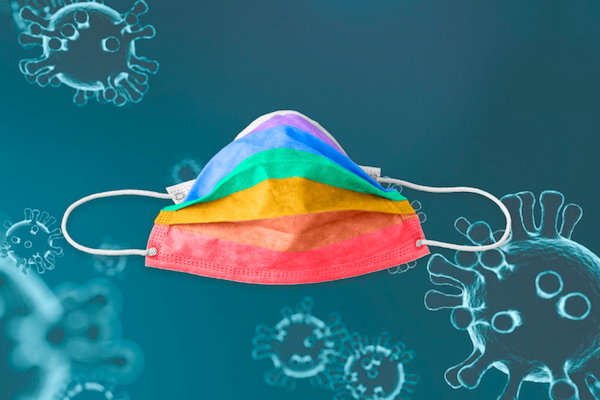Although there is currently no data on COVID-19 infection and death rate among the LGBTQ population, a number of physical and societal factors make LGBTQ people susceptible to contracting the virus. The LGBTQ Cancer Center created a letter signed by over 100 national organizations to bring attention to factors that could make LGBTQ people high-risk. The letter also urges a targeted response to protect LGBTQ vulnerable populations.
The Facts
People with pre-existing chronic health conditions are more likely to suffer severe coronavirus symptoms making the disease more likely to be fatal. A 2017 study found that more LGBTQ adults were immunocompromised than their heterosexual counterparts. LGBTQ people use tobacco at rates 50% higher than the general population and have higher rates of cancer. One in six gay or bisexual men will be diagnosed with HIV in their lifetime. More than one in five transgender adults have one or more chronic health conditions including diabetes, asthma, or arthritis.
Mental Health
Although mental health issues don’t make a person more susceptible to coronavirus, they do make quarantining more dangerous. Because of discrimination and stigma, LGBTQ people are more likely to suffer mental health disorders. LGBTQ young people are four times as likely to feel suicidal or self-harm than their heterosexual counterparts, and suicide is the second leading cause of death between LGBTQ people ages 10 – 24.
In 2019, 39% of LGBTQ youth said they had considered suicide in the past year. The less accepting a LGBTQ teen’s family is, the more likely they are to feel depressed and suicidal. LGBTQ people are more likely to turn to drugs and alcohol to self-medicate—they have a three times greater risk of developing an opioid use disorder than non-LGBTQ individuals. Many LGBTQ people receive support from schools and counseling services that have closed due to COVID-19.
Stressors
Unemployment, illness, and food and housing insecurity are all stressors that can increase the risk of anxiety, depression, and suicide. Domestic violence in the LGBTQ community occurs at an equal or higher rate than the general population. One 2012 study found that 32% of homeless LGBTQ youths faced physical, emotional, or sexual abuse at home. Stay-at-home orders protect the general population from the virus but don’t protect LGBTQ teens from unsupportive or abusive families.
Homelessness
LGBTQ folks have higher rates of poverty and lower rates of homeownership than non-LGBTQ people. For LGBTQ people of color, seniors, and homeless individuals, coronavirus poses an even greater threat. LGBTQ homeless youth compromise 40% of all youth experiencing homelessness, despite being just 7% of the total US population. They also have a 120% higher risk of being homeless.
One in five trans people will experience homelessness in their lifetime. Of the 10,000 US homeless shelters, at least 250 are specifically for LGBTQ people, but hundreds have temporarily closed. There are three million older LGBTQ people living in the US that are at a much greater risk of dying from COVID-19, and they are less likely to reach out to health and aging providers due to discrimination. They are also twice as likely to be single and live alone.
Medical Care
For LGBTQ people, especially trans individuals, discrimination becomes a serious barrier to seeking medical care. Studies show that 70% of trans people experienced discrimination while seeking health care and 23% of trans people did not see a doctor for fear of being mistreated. A 2015 survey showed that 13% of trans people did not have access to health insurance. Since transition-related surgeries are not deemed essential, many have been postponed.
Resources
GLMA has a list of welcoming health providers, HRC has a list of LGBTQ friendly hospitals, and CenterLink has a LGBTQ Community Center Directory. Whitman-Walker has in-person respiratory clinics to treat patients affected by COVID-19 and are offering a number of support groups, counseling services, and PrEP Clinic online, as is LA’s LGBT Center and New York’s LGBT Center. Trevor Lifeline has a 24/7 hotline for mental health support and SAGE has an elder LGBTQ hotline. Some centers, such as Side by Side in Virginia and the LGBT Life Center, are offering virtual game and movie nights for LGBTQ folks. Most importantly, call your LGBTQ friends and check in on them.


